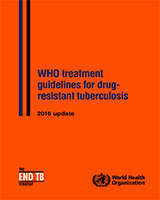Excerpt
This 2011 update of Guidelines for the programmatic management of drug-resistant tuberculosis is intended as a tool for use by public health professionals working in response to the Sixty-second World Health Assembly's resolution on prevention and control of multidrug-resistant tuberculosis and extensively drug-resistant tuberculosis. Resolution WHA62.15, adopted in 2009, calls on Member States to develop a comprehensive framework for the management and care of patients with drug-resistant TB.
The recommendations contained in these guidelines address the most topical questions concerning the programmatic management of drug-resistant TB: case-finding, multidrug resistance, treatment regimens, monitoring the response to treatment, and selecting models of care. The guidelines primarily target staff and medical practitioners working in TB treatment and control, and partners and organizations providing technical and financial support for care of drug-resistant TB in settings where resources are limited.
This guideline was developed in compliance with the process for evidence gathering, assessment and formulation of recommendations, as outlined in the WHO Handbook for Guideline Development (version March 2010; available at www.who.int/hiv/topics/mtct/grc_handbook_mar2010_1.pdf).
The designations employed and the presentation of the material in this publication do not imply the expression of any opinion whatsoever on the part of the World Health Organization concerning the legal status of any country, territory, city or area or of its authorities, or concerning the delimitation of its frontiers or boundaries. Dotted lines on maps represent approximate border lines for which there may not yet be full agreement.
The mention of specific companies or of certain manufacturers' products does not imply that they are endorsed or recommended by the World Health Organization in preference to others of a similar nature that are not mentioned. Errors and omissions excepted, the names of proprietary products are distinguished by initial capital letters.
All reasonable precautions have been taken by the World Health Organization to verify the information contained in this publication. However, the published material is being distributed without warranty of any kind, either expressed or implied. The responsibility for the interpretation and use of the material lies with the reader. In no event shall the World Health Organization be liable for damages arising from its use.


